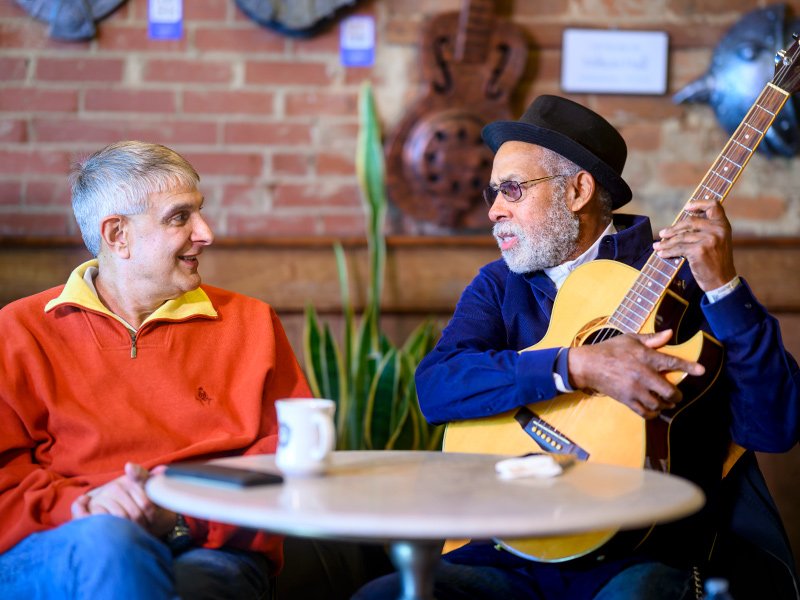At Alamance Regional, the Wings to Recovery mentorship program results in lifelong bonds.

Back in what he calls his “long hair days,” Michael, a talented musician, performed with several rock bands, playing in venues from Atlanta to Cleveland. Years later, in 2021, he faced a different kind of gig, toting his guitar with him into a place he calls “the bubble,” an isolated room at UNC Medical Center, where he underwent a bone marrow transplant following cancer treatment at Alamance Regional Medical Center.
Alone and confronting one of the biggest challenges of his life, Michael found comfort in having his guitar at his bedside. But nothing eased his mind more than talking with someone who’d already experienced the same month-long procedure and could tell him what to expect.
“Many patients tell me that they wouldn’t have completed their treatments without the guidance of a mentor,” says Rosa Davis, program director of Wings to Recovery at Cone Health Cancer Center at Alamance Regional. The program supports cancer patients with chemotherapy and transition classes and by pairing them with survivors who provide hope and clarity.
“Alex had just been through a bone marrow transplant, so I connected him with Michael,” Davis remembers. Alex and Michael both have multiple myeloma, a blood cancer that develops in the plasma cells of the bone marrow.
“Before my diagnosis, I was having bad back pain,” Michael recalls, then adds with a laugh, “I thought it could have been an old karate injury. Or maybe an ex-girlfriend sticking pins in my back.” Alamance Regional began Michael’s chemo right away. Then it came time for the bone marrow transplant — but not before meeting Alex to learn more about the procedure, a connection made possible by the Wings to Recovery mentor program.
“I wanted to give him the opportunity to ask any questions he had about the bone marrow transplant and what life is like while you are in the transplant unit,” Alex says. “This allowed him to be comfortable with what he was going to face instead of fearing the unknown.”
They met at Press, a coffee shop in Graham. “We had a natural affinity toward one another,” Alex says. “We talked about what it’s like to go through everything, but we also bonded over music. Rosa said we would get along great, and she was right.”
“Rosa’s my girl. I love Rosa,” Michael agrees. “Meeting Alex lessened the fear factor. He was so welcoming to all of my questions. He told me it was easy if I just did what the doctors and nurses told me to do, and I trusted that.”
“Nobody should feel like they are going into a black hole,” Alex says. “Having support and going in with a positive attitude makes a big difference in your recovery.”
Michael, who lost his siblings many years ago, now refers to Alex as his “big brother.”
“I really appreciate his attention,” he says. “I feel for people who are shut in. It helps so much to get out and talk to people like Alex who give a heartfelt listen.”
Davis advocated for the creation of Wings to Recovery, which launched in 2007 with 27 mentors. Now the roster includes more than 50 mentors. Wings to Recovery also includes The Nest, a resource room where patients can find wigs, scarves and hats.
“We were the only hospital on the entire East Coast to start a program like this,” Davis says. “A hospital in Detroit had a similar one, but they would only accept Stage One and Stage Two cancer patients, and the mentors had to be disease-free. We turn no one away. We offer support for anyone that comes through the doors.”
In Alamance, where community runs deep and donors rally around our patients, support overpowers fear, and friendships are among our best patient outcomes.
